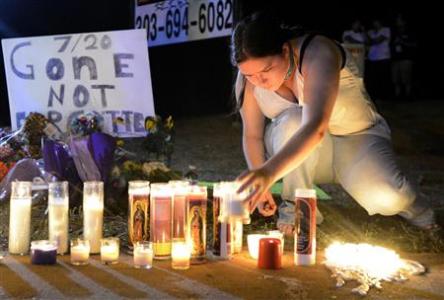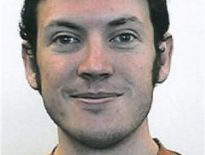(Reuters) – Denver Mayor Michael Hancock is a member of a coalition called Mayors Against Illegal Guns, but when he issued a statement expressing shock and horror on Friday after a mass shooting at a Colorado movie theater, he had nothing to say about gun control.

Neither did President Barack Obama nor his Republican rival Mitt Romney, though both canceled campaign speeches on Friday and expressed sorrow for the victims of the shooting rampage.
The killing of 12 people at a midnight screening of the new Batman movie in the Denver suburb of Aurora may spark a fresh round of soul-searching on America’s relationship with guns but few predict any real change in the law.
That’s because gun control advocates have largely lost the argument against the much more powerful gun lobby, and politicians know the issue is toxic with voters.
One of the few politicians who has long taken a stand is New York Mayor Michael Bloomberg, the billionaire backer of Mayors Against Illegal Guns, a coalition of mayors advocating for stricter rules on gun sales and ownership.
Speaking on WOR Radio on Friday, Bloomberg called on Obama and Romney to tell the public what they would do to reduce gun violence.
“Soothing words are nice, but maybe it’s time that the two people who want to be president of the United States stand up and tell us what they are going to do about it,” he said.
“I don’t think there’s any other developed country in the world that has remotely the problem we have,” Bloomberg said. “We have more guns than people in this country.”
Most Americans, however, do not believe that tougher gun laws would be the solution. Gallup polls over the last two decades show the percentage of Americans who favor making gun control laws “more strict” fell from 78 percent in 1990 to 44 percent in 2010.
The Brady Center to Prevent Gun Violence, the largest and oldest of America’s gun-control groups, is a fraction of its peak size. The center and an affiliated political arm had revenue of $5.9 million in 2010, the most recent year for which information is publicly available – down 27 percent in three years.
In the same year, the powerful pro-gun lobby, the National Rifle Association (NRA), and its various components took in $253 million from individuals, gun makers and sellers and other supporters.
Even Democratic supporters of efforts to keep a tighter rein on weapons were relatively mum after the shooting.
Democrats in conservative and rural states fear alienating gun owners and the NRA, and crucial presidential battleground states like Ohio, Pennsylvania, Wisconsin, Virginia, Iowa and North Carolina have large populations of enthusiastic gun owners.
“We’re in the summer before a presidential election and I really don’t foresee any serious discussion of gun control,” said Kristin Goss of Duke University, the author of “Disarmed: The Missing Movement for Gun Control in America.”
Some supporters of Democrat Al Gore still believe his support for gun control laws played a role in his loss of the 2000 presidential election, and “memories of lost elections loom large for politicians,” Goss said.
Evan Bayh, a former Democratic senator from the conservative state of Indiana, described the dilemma facing Democrats who favor gun control and live in Republican-leaning states.
“You have a lot of people who feel passionately about that issue. … So, many members of Congress are faced with the decision: Do they sacrifice all the other good they hope to accomplish for this one issue? And do they sacrifice their own careers for this one issue?”
Congress has not approved any major new gun laws since 1994, and a ban on certain semiautomatic rifles expired in 2004. Some states have loosened gun laws to allow gun owners to carry concealed weapons or adopted “Stand Your Ground” self-defense laws.
A Reuters-Ipsos poll in April found most Americans supported the right to use deadly force to protect themselves, and two of every three respondents had a favorable view of the NRA, which marshals thousands of activists to oppose even small-scale gun regulations and punish lawmakers who challenge them.
‘STRONG FORCES’
“There are strong forces in American politics, led by the National Rifle Association, that have prevented any real changes in gun control laws in years,” said Cal Jillson, a political analyst at Southern Methodist University in Texas.
“In the short term, this incident will give some liberal Democrats an opportunity to talk about gun control in an environment where people are listening, but in the long term it doesn’t change anything,” he said.
Other high-profile gun-related mass shootings in recent years – the Virginia Tech shootings in 2007 and the shooting of U.S. Representative Gabrielle Giffords and others in Arizona in January 2011 – also sparked some short-term debate but little action.
Opponents of stricter gun control point to events such as last year’s killing of 77 people in Norway, which like the rest of Europe has much tighter controls on guns than the United States, as evidence that gun laws don’t stop such tragedies.
The NRA said in a statement: “Our thoughts and prayers are with the victims, their families and the community. NRA will not have any further comment until all the facts are known.”
Mayor Hancock of Denver, a Democrat, issued a statement saying it was a tragic day and pledging support for those affected by this “senseless, senseless” act. “Our hearts are broken but we are determined to move forward together,” he said.
Obama, who supported the lapsed assault weapons ban during the 2008 campaign, has made no effort as president to curb gun rights and has rarely discussed the issue.
Many gun enthusiasts still distrust him, however, and the NRA uses the specter of a potential second term for Obama – when he would be unrestrained by the demands of re-election – to raise money and keep its conservative base on edge.
The NRA spent at least $40 million in 2008 to try to defeat Obama, who famously told the audience at a California fund raiser in April 2008 that it was not surprising that small town and rural residents in states like Pennsylvania “get bitter, they cling to guns or religion or antipathy to people who aren’t like them.”
Romney, a former governor in liberal Massachusetts, has courted the NRA and its followers in recent years with promises to support their rights but has offered few details and earned little enthusiasm.
He got a tepid response at the NRA convention in April, when fewer than 200 of his 2,600-word speech was devoted to gun rights or gun issues.
Some gun enthusiasts remember Romney’s 2007 quote during his first run for president that he was “not a big-game hunter, I’ve always been a rodent and rabbit hunter. Small varmints, if you will.”
Jim Kessler, former policy director for Americans for Gun Safety, said guns owners far outnumber victims of gun crime, so the odds are stacked against gun control advocates. Some 32 percent of households owned a gun in 2010.
Moreover, it often isn’t immediately apparent what gun laws would have made a difference in specific cases.
“When there’s a crime such as this, it often takes a few days of police work to figure out if a gun loophole has been evaded to cause the crime or if there has been a hole in the gun laws to allow someone to get the guns,” he said.
(Additional reporting by Emily Flitter, Jeff Mason, Thomas Ferraro; Editing by Claudia Parsons and Jim Loney)





